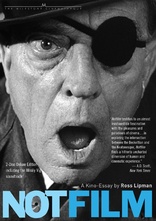Notfilm Blu-ray Movie
HomeNotfilm Blu-ray Movie 
Milestone | 2015 | 129 min | Not rated | Mar 07, 2017Movie rating
6.8 | / 10 |
Blu-ray rating
| Users | 0.0 | |
| Reviewer | 4.5 | |
| Overall | 4.5 |
Overview
Notfilm (2015)
A documentary on the making of the 1965 short entitled "Film", the only work of cinema written by Nobel Prize-winning author Samuel Beckett.
Starring: Buster Keaton, Kevin Brownlow, James Karen, Leonard Maltin, Haskell WexlerNarrator: Ross Lipman
Director: Ross Lipman
| Documentary | 100% |
Specifications
Video
Video codec: MPEG-4 AVC
Video resolution: 1080p
Aspect ratio: 1.33:1
Original aspect ratio: 1.33:1
Audio
English: DTS-HD Master Audio 5.1 (48kHz, 16-bit)
Subtitles
English, French, German, Portuguese, Spanish
Discs
Blu-ray Disc
Two-disc set (2 BDs)
Playback
Region A (B, C untested)
Review
Rating summary
| Movie | 4.5 | |
| Video | 4.5 | |
| Audio | 4.0 | |
| Extras | 4.0 | |
| Overall | 4.5 |
Notfilm Blu-ray Movie Review
More Film Review
Reviewed by Michael Reuben March 17, 2017In 2011, filmmaker and restorationist Ross Lipman set out to restore the 1965 short feature
entitled Film, which was the sole venture into
cinema
by Nobel Prize-winning author Samuel
Beckett. But when Lipman consulted the film's elderly producer, Barney Rosset, he discovered
an unexpected treasure trove of material, including trims, outtakes and recordings of pre-production conversations between Beckett and his artistic
collaborators. As Lipman worked on
Film's restoration, a parallel project took shape: a sustained examination of how several
distinctive talents, including silent film legend Buster Keaton, united to create a work that was
much anticipated at the time, but, when it arrived, disappointed its creators and left viewers
baffled.
The result of Lipman's efforts is a unique and challenging documentary to which he has given
the Beckett-style title, Notfilm. At six times the length of the short that is its nominal
subject, Notfilm invites the viewer to join Lipman on his voyage of discovery. Backed by crowd-sourced funding, the documentary was
produced by Amy Heller and Dennis Doros, proprietors of
Milestone Film & Video, which is releasing both Film
and Notfilm on Blu-ray.
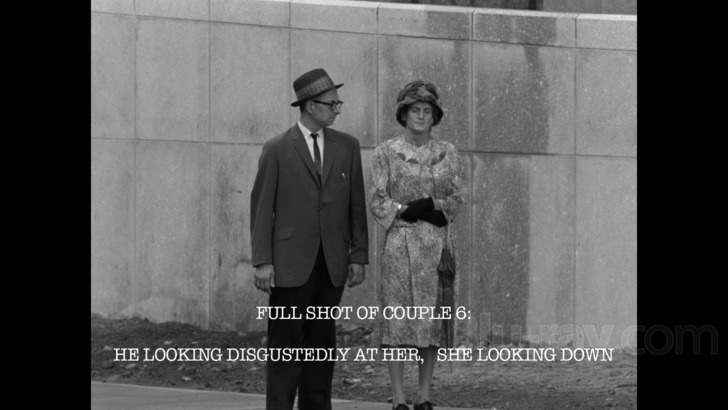
Lipman's documentary traces the development of Film in detail, which necessarily involves an overview of Beckett's life and literary career. When the author began writing the screenplay in April 1963, he had not yet won the Nobel Prize for Literature, but he had already achieved worldwide fame, thanks to the success of Waiting for Godot, which premiered in Paris in January 1953 and continues to be revived and restaged all over the world to this day. Shy, bookish and reclusive, Beckett was never comfortable with acclaim, and he was notorious for his reluctance to be photographed or recorded. The systematic efforts of Film's unnamed protagonist, dubbed "O" in the shooting script, to escape from the world's sight can be seen as an outgrowth of the author's personal reticence, but as Lipman demonstrates, the question of being seen was an essential element of Beckett's art and philosophy long before fame caught up with him.
In 1964, the reclusive author made his first, and as it turned out, only trip to America to participate in the production of Film. Pre-production involved lengthy conversations among Beckett, director Alan Schneider (a theater director making his film debut), Oscar-winning cinematographer Boris Kaufman (On the Waterfront), art director Burr Smidt and producer Rosset, who was also Becket's U.S. publisher. Rosset surreptitiously recorded many of these conversations, and Lipman uses excerpts from the tapes, along with Beckett's original script (published many years later) to illuminate the meticulous design behind the 22-minute feature. He then takes the viewer through Film scene by scene, examining how the initial concept was transformed into the stubbornly enigmatic final product and teasing out the conceptual subtext that the short's creators were attempting to translate into a cinematic experience. Much of Notfilm plays like an annotated version of Film, accompanied by an erudite commentary track from a devoted fan.
The production of Film attracted contemporary media attention not only because of Beckett's involvement, but also because of star Buster Keaton, whose "Great Stone Face" seemed an ideal match for the author's comically bleak dramaturgy. In fact, the combination was pure coincidence, as Keaton was recruited at the last minute to replace the actor originally cast, and the aging comedian took the role solely for the money, of which he was chronically in need. An experienced director in his own right, Keaton found Film's script nonsensical and the production amateurish; he would repeatedly declare in later years that he had no idea what "those guys" were trying to do. One of Lipman's many interviewees is character actor James Karen, who had already been cast for a small role in Film when the original lead dropped out and who recommended his old friend Keaton as a replacement. Karen's recollections of the legendary comic and his experiences of working with Beckett and Schneider are among the highlights of Notfilm.
Lipman has assembled a wide array of additional interview subjects, several of whom he managed to interview not long before they passed away. Actress Billie Whitelaw, widely regarded as the foremost interpreter of Beckett, is suffering from failing memory but still manages to provide an eloquent account of her approach to the writer's challenging material. Cinematographer Haskell Wexler, who would win his own Oscar the year after Film's release for Who's Afraid of Virginia Woolf?, discusses the photography of his friend Boris Kaufman, who was the brother of Russian director Dziga Vertov and shared Wexler's affinity for filming in black-and-white and with handheld cameras. (Wexler, whose Medium Cool is also a reflection on the camera's eye, died in 2015; Whitelaw passed away in 2014.) Alan Schneider's widow, Jean, recalls her husband's work on Film and his relationship with Beckett. Film critic Leonard Maltin, who was a teenager when Film was made, recounts reading about the project in the paper and setting off with a friend in search of the production crew on location in lower Manhattan; he found them and stayed to watch.
Lipman weaves these disparate materials into a provocative collage that, while it may not rescue Film from its shortcomings, nevertheless makes a compelling case for its importance as a cinematic artifact produced with the highest of aspirations. After watching Notfilm, you see Film with a new appreciation for what its creators were trying to accomplish—and a renewed sense of the possibilities of cinema as an art form.
Notfilm Blu-ray Movie, Video Quality 
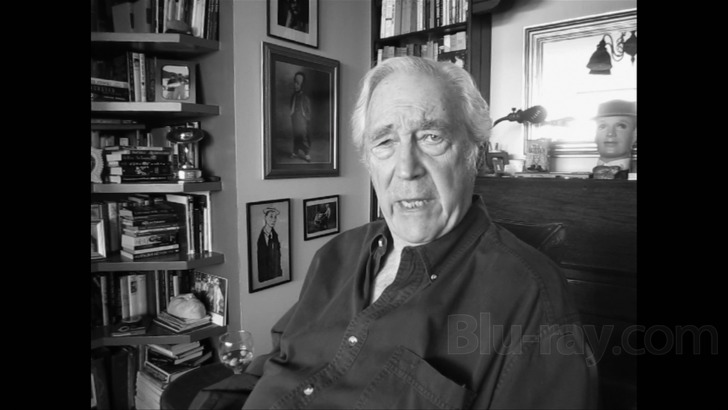
Except for a few stray shots, Nonfilm is presented in black-and-white, allowing Lipman to coordinate
the excerpts from the B&W Film and from many early silents with the contemporary interview
footage. The documentary was completed on a digital intermediate, where efforts have obviously
been made to harmonize old sources and new, damaged and pristine, into a coherent whole.
Lipman served as his own cinematographer for the interviews, which are of varying quality, with
some sharper than others. Milestone's 1080p, AVC-encoded Blu-ray offers an image that is as
clean, sharp and detailed as the individual sources will allow. The new interviews are crisp (for
the most part), as are most of the archival photographs. Silent film footage and videotapes of
theatrical productions or early TV broadcasts vary according to the quality of the original. Like
most documentaries, Notfilm isn't eye candy, nor is it meant to be. It is, however, smartly edited
to create visual interest from constant shifts in subject and perspective, and Milestone's Blu-ray
captures the effect admirably. The average bitrate of 34.91 Mbps and a capable encode ensure the
accuracy of translation to the home theater.
At several points throughout the documentary, Lipman draws a contrast between Film, which is a
product of the analog world, and Nonfilm, which is a purely digital creation born of the project to
resurrect Film in the digital domain. His observations could apply to almost any film restoration,
but somehow they gain additional emphasis in a conceptual world defined by Beckett.
Notfilm Blu-ray Movie, Audio Quality 
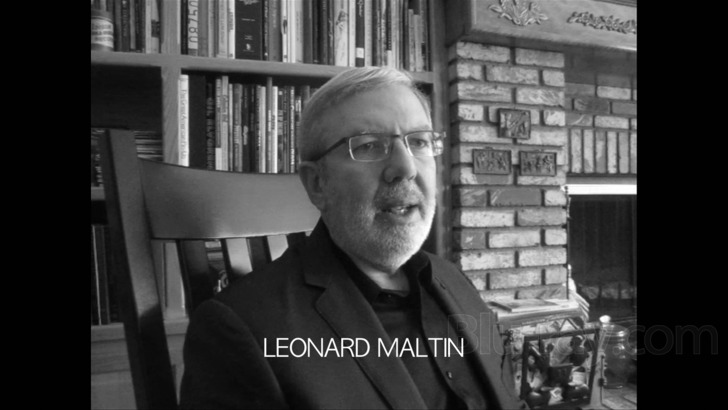
Nonfilm arrives with a 5.1 soundtrack encoded in lossless DTS-HD MA. There is occasional audio from archival sources, but the soundtrack is dominated by the voices of interviewees, which are centered in the front and clearly rendered; by Lipman's narration, which spreads across the front soundstage and is equally clear; and by the understated chamber music score by Hungarian composer Mihály Vig, a frequent collaborator of director Béla Tarr (The Turin Horse). Vig's gently sad instrumentals have been carefully spread throughout the speaker array so that they seem to float above the activity onscreen.
Notfilm Blu-ray Movie, Special Features and Extras 
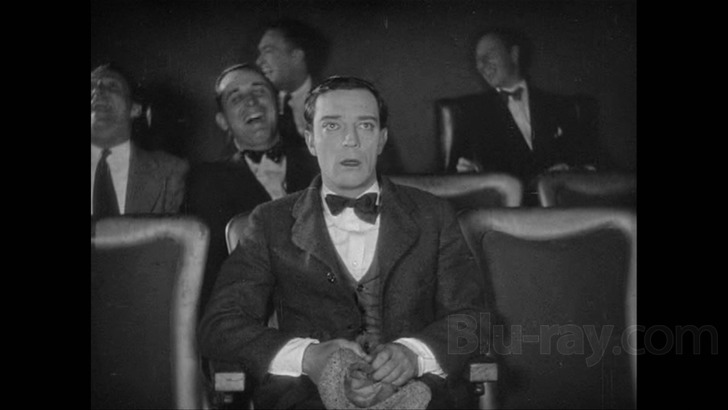
All of the extras can be found on disc 2.
- The Street Scene (lost scene) (1080p; 1.34:1; 6:09): A reconstruction of Film's opening scene as originally planned, using production stills, surviving takes and the shooting script.
- "What if E's Eyes Were Closed?" (audio only; 6:43): A discussion among Beckett, Schneider, cinematographer Kaufman and art director Burr Smidt regarding an alternate approach to Film's ending.
- Buster Keaton and Film: James Karen in Conversation (1080i; 1.33:1; 41:51): The veteran character appears briefly but memorably in Film's opening scene and again in the photographs that "O" reviews as he sits in his rocking chair. Here, interviewed at the Billy Wilder Theater on March 13, 2011, Karen recalls his work on the project, his friendship with the legendary star and the memorable experience of joining Keaton in giving Beckett a tour of New York City.
- Memories of Samuel Beckett: An Afternoon with James Knowlson (1080i; 1.33:1; 8:00): In outtakes from Lipman's interview with Beckett's biographer, Knowlson relates anecdotes about the eccentric writer.
- Jean Schneider: Memories of Alan Schneider (1080i; 1.33:1; 11:01): In outtakes from Lipman's interview with the director's widow, she discusses her husband's work with Beckett.
- Jeannette Seaver: Beckett and Godot (1080i; 1.33:1; 4:13): Seaver is the widow of Richard Seaver, former editor-in-chief of Grove Press, Beckett's U.S. publisher. Here, she relates anecdotes about Waiting for Godot—and about asking Beckett to dance with her.
- Photographing Film
- Photographing Film (1080i; 1.33:1; 6:41): Photographers I.C. Rapoport and Steve Shapiro recount encounters with the notoriously camera-shy Beckett.
- Documenting Film (photo gallery) (1080p; various): Three galleries of photos by the two photographers.
- Music from Notfilm: Score by Mihály Vig (audio only; 24:56): Eleven selections from the score, which can be selected separately or with a "play full score" function. An option to download the score is also available.
Notfilm Blu-ray Movie, Overall Score and Recommendation 
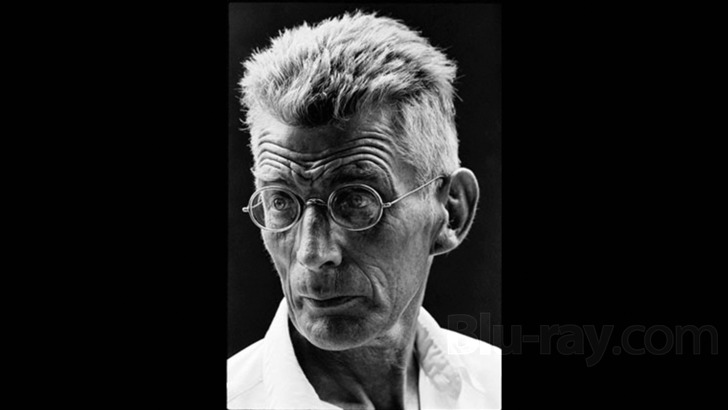
Notfilm stands on its own as a work of cinematic history, biography and film theory, and it's so
loaded with suggestive observations that multiple viewings are both rewarding and, indeed,
necessary. You don't need to have seen Film in advance, but it's better if you have, so that you
can fully appreciate the effort that Lipman has invested in penetrating its often opaque surface.
The documentary was obviously as much a passion project for it director as the restoration of
Film. Milestone's presentation is excellent, and the extras are informative and enriching. Highly
recommended.
Similar titles
Similar titles you might also like
(Still not reliable for this title)

Tongues Untied
1989

Gates of Heaven
1978

Grey Gardens
1975

Around the World with Orson Welles
1955

Paris Is Burning
1990

Symbiopsychotaxiplasm: Take One
1968

Tiny: The Life of Erin Blackwell
2016

Ethnic Notions
1986

Black Is... Black Ain't
1995

Streetwise
1984

British Sounds
See You at Mao
1969

Leviathan
2012

Divine Horsemen: The Living Gods of Haiti
1985

Color Adjustment
1992

The Creeping Garden
Limited Edition
2014

Women Make Film: A New Road Movie Through Cinema
2018

The Last of the Unjust
Le dernier des injustes
2013

Wheel of Time
2003

The Story of Film: A New Generation
2021

The Story of Film: An Odyssey
2011
